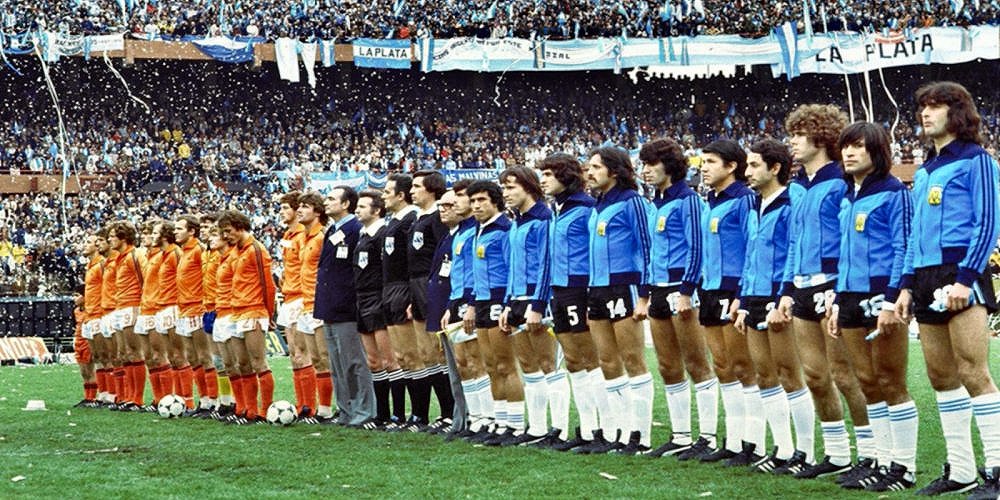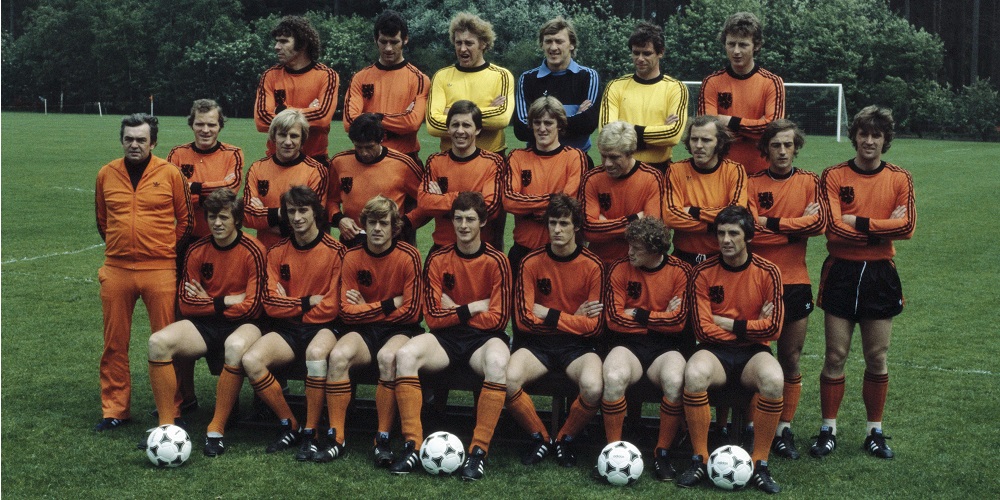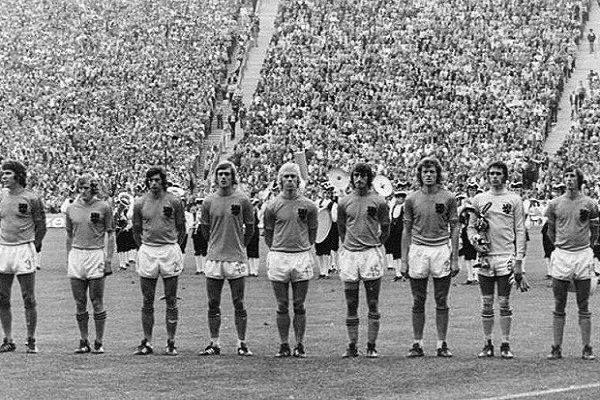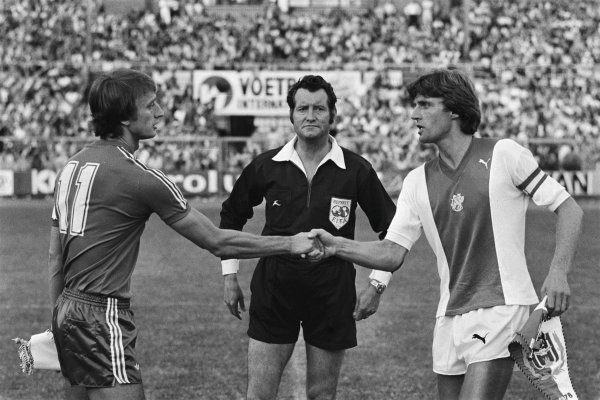The Story of the Netherlands at the 1978 World Cup

Photo: Wikimedia Commons
May, 1978. The Netherlands squad pack their bags onto their KLM flight and head off to the World Cup in Argentina. Things had changed since the Netherlands 1974 World Cup campaign - Rinus Michels was gone. And Johan Cruyff was gone. The Austrian coach Ernst Happel was now in charge, and although many of the 1974 World Cup squad were still available, they'd also lost another key player in Wim van Hanagem. The brilliant midfielder, who had left Feyenoord and moved to AZ'67, had been in tears as he announced his withdrawal from the tournament on Dutch TV. Apparently, he'd not been guaranteed a place in the team and was also involved in a dispute with Arie Haan.
There was still the makings of a great team though, with the likes of Ruud Krol, Johan Neeskens, Arie Haan, the Van Der Kerkhof twins, all lining up behind the attacking talent of Johnny Rep and Rob Rensenbrink.
THE SQUAD
The Netherlands 22 man squad that was picked for the 1978 World Cup tournament:
| No. | Player | Pos | Club | Age | Caps |
|---|---|---|---|---|---|
| 1 | Piet Schrijvers | GK | Ajax | 31 | 16 |
| 2 | Jan Poortvliet | DF | PSV Eindhoven | 22 | 1 |
| 3 | Dick Schoenaker | MF | Ajax | 25 | 0 |
| 4 | Adrie van Kraay | DF | PSV Eindhoven | 24 | 13 |
| 5 | Ruud Krol (c) | DF | Ajax | 29 | 52 |
| 6 | Wim Jansen | MF | Feyenoord | 31 | 50 |
| 7 | Piet Wildschut | DF | FC Twente | 20 | 1 |
| 8 | Jan Jongbloed | GK | Roda JC Kerkrade | 37 | 19 |
| 9 | Arie Haan | MF | Anderlecht | 29 | 24 |
| 10 | René van de Kerkhof | MF | PSV Eindhoven | 26 | 20 |
| 11 | Willy van de Kerkhof | MF | PSV Eindhoven | 26 | 18 |
| 12 | Rob Rensenbrink | FW | Anderlecht | 30 | 34 |
| 13 | Johan Neeskens | MF | Barcelona | 26 | 38 |
| 14 | Johan Boskamp | MF | Molenbeek | 29 | 1 |
| 15 | Hugo Hovenkamp | DF | AZ | 27 | 7 |
| 16 | Johnny Rep | FW | Bastia | 26 | 23 |
| 17 | Wim Rijsbergen | DF | Feyenoord | 26 | 25 |
| 18 | Dick Nanninga | FW | Roda JC Kerkrade | 29 | 1 |
| 19 | Pim Doesburg | GK | Sparta Rotterdam | 34 | 2 |
| 20 | Wim Suurbier | DF | Schalke 04 | 33 | 56 |
| 21 | Harry Lubse | FW | PSV Eindhoven | 26 | 1 |
| 22 | Ernie Brandts | DF | PSV Eindhoven | 22 | 1 |

Photo: Wikimedia Commons / Hans Peters
THE 1ST ROUND, RENSENBRINK MAKES HISTORY
Without Johan Cruyff, the pressure was on Rob Rensenbrink and Johnny Rep to provide the goals, aided this time by Rene van der Kerkhof and Neeskens, who was playing in a more advanced role than at the 1974 World Cup. Indeed, a few of the team had been pushed further forward - Arie Haan and Wim Jansen, both of whom could play in defence, were now in midfield.
The Dutch found themselves in Group 4, alongside Peru, Scotland and Iran. It was a decent draw and a group which they were expected to qualify from comfortably. They started their campaign with a decent 3:0 victory over Iran, Rensenbrink grabbing an early tournament hat-trick, two of them penalties as he'd now taken over the spot-kick duties from Johan Neeskens.
A nil-nil draw against Peru put them in the driving seat for the group, and they headed into the final game against Scotland knowing that a draw, or even a narrow defeat, would probably be enough to take them into the second round.
Rob Rensenbrink made history as he gave the Dutch the lead in the 34th minute - his penalty was the 1,000th goal in World Cup history. However, a fantastic Scotland comeback, including an inspired goal by Archie Gemmill, put the Dutch on the brink of an unlikely exit. With Peru comfortably beating Iran, the Dutch realised that another Scottish goal would knock them out on goal difference. Johnny Rep put paid to that idea though, as, just three minutes after Gemmill's great goal, he scored an absolute beauty of his own - lashing a strike into the top corner from way outside the box, a despairing Alan Rough unable to keep it out.
Johnny Rep's fantastic strike against Scotland
ROUND 2
The narrow defeat to Scotland put the Netherlands through to the second round, and another group of four teams. The 1978 World Cup was following the same format as the 1974 World Cup, which meant no semi-finals matches. Instead, the winners of the two second-round groups progressed directly to the final itself. The Dutch found themselves in Group A, alongside fellow European heavyweights West Germany and Italy, as well as Austria, who'd surprised everybody by topping Group 3, pipping Brazil by goal difference.
It soon became apparent that the Austrians wouldn't be topping this group though, as the Netherlands demolished them 5:1 in Córdoba, Rensenbrink tucking away another penalty, Rep getting a brace, and Brandts and Willy Van Der Kerkhof both scoring.
West Germany and Italy had played out a drab goalless draw in their opening match of the group, and as this German side was far removed from the mighty side of ‘74, with no Beckenbauer or Müller, the Dutch went into the match against their old foes full of confidence. It didn't go quite as planned though, the Germans raising their game and twice taking the lead, early on after just three minutes through Rüdiger Abramczik and then again after 70 minutes when Dieter Müller powered home a header. Twice the Dutch came back though. Arie Haan unleashing a thunderbolt to equalise midway through the first half and then eight minutes from time René van de Kerkhof combined with his brother Willy to score another cracker. The game ended frantically and controversially, first Rep hit the woodwork, then Erich Beer nearly put the Germans back in front, and then chaos ensued with Dick Nanninga getting a yellow card for an off the ball incident, immediately being shown a red for apparently laughing at the referee! It took five minutes for things to calm down, and the final whistle went with the Dutch knowing that they faced a winner-takes-all match with Italy in the final game, the Azzurri having beaten Austria 1:0 to move onto three points, the same total as the Netherlands.
René van de Kerkhof equalises against West Germany
Victory for either side would book them a place in the final, whereas a draw would leave the Netherlands ahead of Italy on goal difference but could open the door to West Germany if they beat Austria by more than four goals. The Dutch needn't have worried about that. In a match known in Germany as Die Schande von Córdoba (The Disgrace of Córdoba) and in Austria as Das Wunder von Córdoba (The Miracle of Córdoba), the Hans Krankl inspired Austrians came from behind to beat their neighbours 3:2, Krankl grabbing the winner with just 3 minutes to go.
The result of the Austria-West Germany game made no difference to the Italians, they knew they had to win, and when the match kicked off in the Estadio Monumental they came out on the front foot, all guns blazing. By the midway point of the first half, the momentum had swung completely to the Italians. Firstly, they took the lead when Ernie Brandts scored an own goal trying to stop Roberto Bettega, and then goalkeeper Piet Schrijvers had to be stretchered off and be replaced by the veteran Jan Jongbloed, now aged 37. Italy dominated the rest of the half as the Dutch struggled to get their free-flowing passing moves going, and the game descended into a physical battle. The momentum swung back to the Netherlands after the break though, Brandts more than making amends for his first-half own goal by leathering home from outside the box within five minutes of the restart. Arie Haan made things safe with fourteen minutes to go, with yet another long-range screamer past Dino Zoff.
So, despite having to play the tournament without their star player, De Orange found themselves in a second consecutive final, and yet again they would be facing the hosts, this time César Luís Menotti's Argentina. The way that the Dutch had come from behind against both the West Germans and the Italians showed that they'd certainly got some fighting spirit and resilience in the team, and they were going to need it...
THE FINAL
With more than 70,000 ticker-tape throwing Argentinians packed into River Plate's El Monumental stadium, the atmosphere for the final was frenzied, to say the least. Firstly the Dutch accused the Argentinians of delaying the match after the hosts came out onto the pitch five minutes late. The Argentinians responded by questioning René van de Kerkhof's plaster-cast. The right-winger had played in it previously without anybody questioning it, but was now being asked to re-bandage it. The Dutch retaliated by threatening to walk off the pitch. All this before a ball had even been kicked!
The match eventually got underway and, with the pitch still covered in ticker-tape and the noise from the stands deafening, Argentina's Mario Kempes opened the scoring after 38 minutes, notching his fifth goal of the tournament as he slid the ball under Jan Jongbloed from about 12 yards out. It was a deserved lead as Argentina had been by far the better team in the first half. However, in the second half, the hosts seemed content to hold onto their lead and withdrew their attacking style. The Dutch started to take advantage and began to dominate the second half, looking much more dangerous. They came close to an equaliser with an effort from Rob Rensenbrink, but Ubaldo Fillol saved it with his feet. The Dutch continued to push strongly for an equaliser and it finally came with just eight minutes remaining, Johan Neeskens looping over a fantastic cross from the right and substitute Dick Nanninga heading home.
It was a deserved leveller and turned the game on its head once again. All of a sudden, the Netherlands looked the most likely to go on and claim a winner. And then, ten minutes later, came the true agony of football. The incredibly narrow margins by which the biggest games are sometimes won or lost.
With the score now level at 1:1 and the game in injury-time, a hopeful long ball by Krol saw Rensenbrink ghost in behind the Argentinian defence on the left-hand side and poke the ball past Fillol. But, agonisingly, it hit the post, came back into the goalmouth and was hoofed to safety! With less than a minute to go it would surely have won the World Cup for the Netherlands if it had been an inch to the right. But it stayed out.
Rensenbrink Hits the Postage in Stoppage Time
Argentina managed to regroup at the final whistle and came out on the front foot again in extra-time, Mario Kempes getting a bit of luck with a ricochet as he danced through the Dutch defence to score his second goal just before the extra-time interval. Kempes would have a big part in the final goal as well, surging brilliantly once more into the penalty box, the ball eventually working its way to Daniel Bertoni who slotted home easily to make it 3:1. With just five minutes to go, there was no coming back for the Dutch this time.
So, again the Netherlands left with nothing.
But again they'd entertained the world.
Tweet



